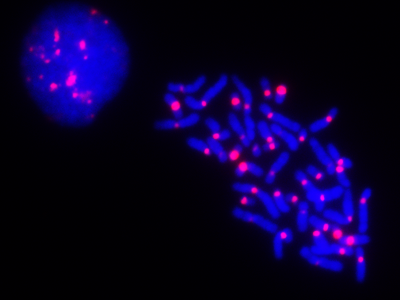RESEARCH
Telomere Group

The telomere refers to the chromatin at the two termini of linear genomic DNA.
Telomeres primarily protect DNA ends from noxious reactions, such as DNA end joining and resection - both of which can potentially lead to cancers. It is known that telomere DNA cannot be completely replicated during proliferation. Accordingly, telomere length is gradually declined in proportion to the total number of cell divisions. As such, telomere functions are dynamically affected by the life stage of organisms. It should be robustly functional prior to and at the time of reproduction.
Prof. Ishikawa has long pursued molecular understanding of telomeres. It is known that telomeres comprise heterochromatin that excludes the access of various factors, both harmful and beneficial. He is now interested in how telomeres are maintained by proper replication and DNA repair, in spite that molecules necessary for these reactions are paradoxically expelled by the telomere heterochromatin.
Telomeres primarily protect DNA ends from noxious reactions, such as DNA end joining and resection - both of which can potentially lead to cancers. It is known that telomere DNA cannot be completely replicated during proliferation. Accordingly, telomere length is gradually declined in proportion to the total number of cell divisions. As such, telomere functions are dynamically affected by the life stage of organisms. It should be robustly functional prior to and at the time of reproduction.
Prof. Ishikawa has long pursued molecular understanding of telomeres. It is known that telomeres comprise heterochromatin that excludes the access of various factors, both harmful and beneficial. He is now interested in how telomeres are maintained by proper replication and DNA repair, in spite that molecules necessary for these reactions are paradoxically expelled by the telomere heterochromatin.